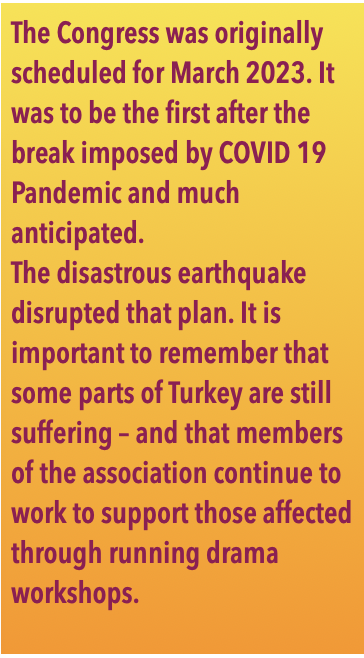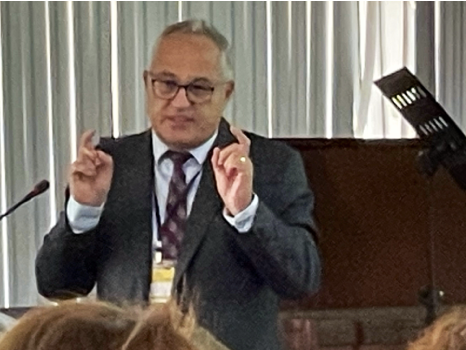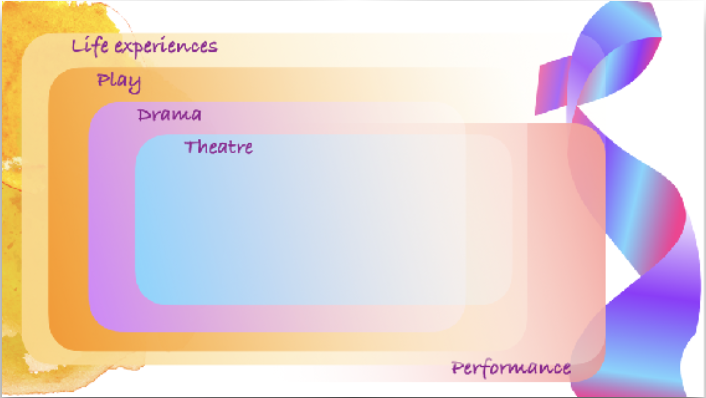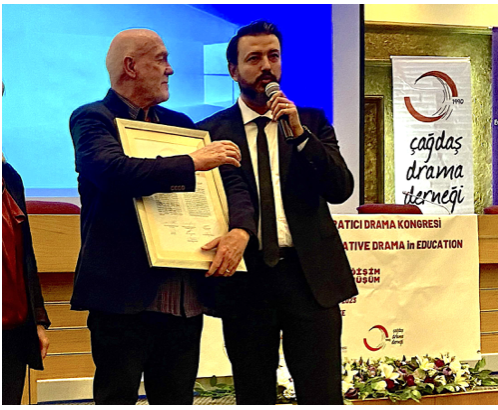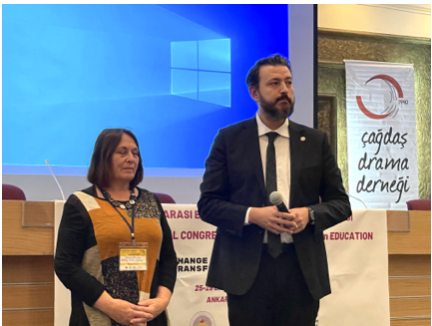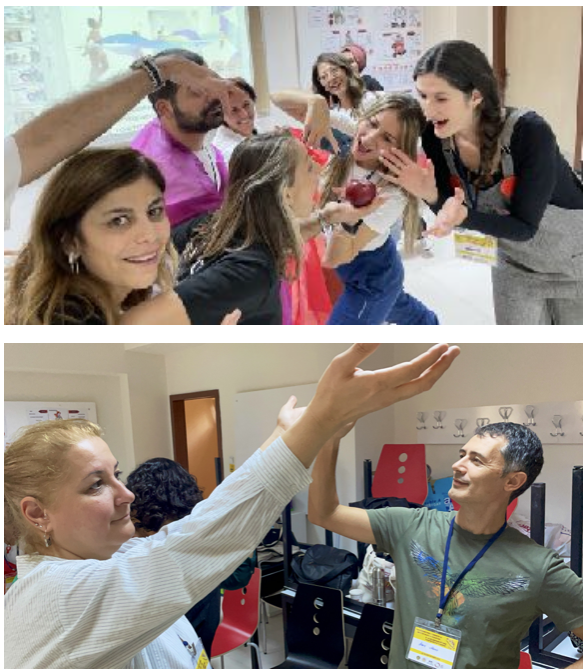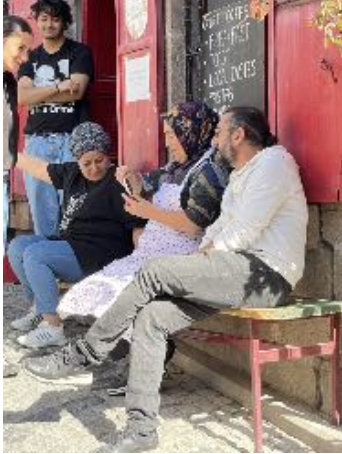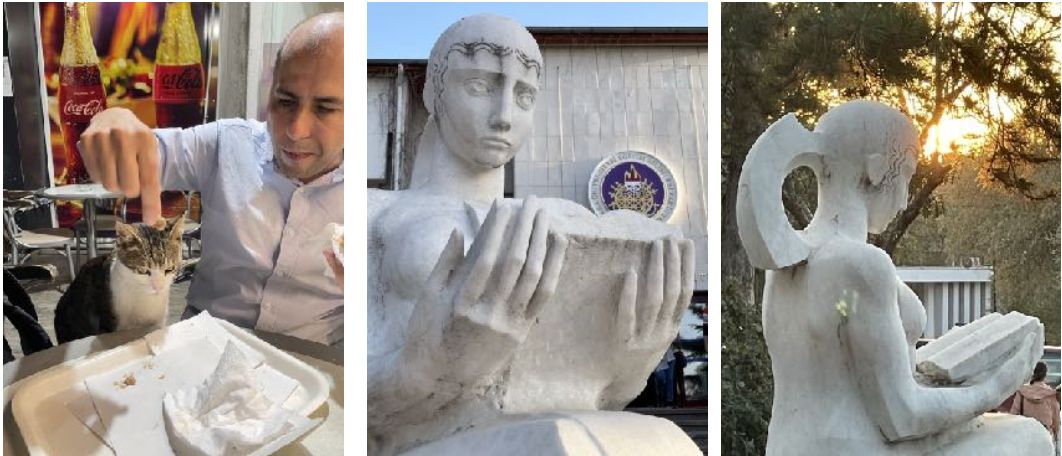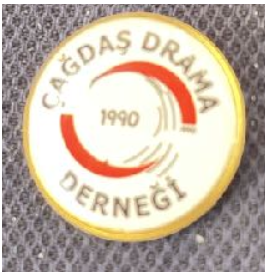A short report for IDEA from Ankara University where I am for the 31st Çağdaş Drama Derneği Congress.
/During the congress I made some notes to share with the IDEA Community.
The Congress theme was ‘change and transition responding especially after the Covid 19 pandemic when most things have changed in human life and in the drama field.
International workshop leaders
Joining the local participants were workshop leaders familiar to the IDEA Community. Patrice Baldwin, Juliane Lenssen from Berlin, David Allen, Dr. Christina Zoniou, University of the Peloponnese, Nikos Govas also from Greece.
Once again, we are reminded of the richness of shared knowledge within the field of drama education.
The congress included workshops and presentations from Turkish drama educators as well as keynotes. Of course, I had only a small window into those presentations, but share a couple of points that I think are of international interest.
Congress theme image: chameleon
A crisply articulate keynote from Prof.Dr. ÖMER ADIGÜZEL focusing on the Congress image of the chameleon. With a firm sense of humour Ömer noted that chameleon signal their social states responding to changing environments.
“Every action of a chameleon symbolises change, development and transformation - the Congress themes.”
He then noted the discrepancies between guidelines for schools and the realities of what happens. He highlighted the categorisation of drama and acting as “entertainment services” that gives the impression that the field of drama is limited to that category. And he concluded with discussion of the situation for training teachers to teach drama.
Chameleons also tell us about camouflage. I wondered about the times when we as drama educators needed to work our magic under the cover of camouflage.
Thoughtful and challenging ideas to explore.
A familiar controversy that IDEA needs to again address
Following a lecture from a German professor a member of the audience opened up a demarcation dispute: Drama pedagogy/Theatre pedagogy/Acting pedagogy (an issue that lingers in the very name of IDEA as an association – in English)
Are we seeing a world of education rent apart by unhelpful distinctions and marking out of territories. In the very title of IDEA as an association there’s a potential fault line that we dance on uncomfortably.
These terminologies niceties catapult us back to the so-called civil wars in drama/theatre education in the UK in the 1980/90s. They were not helpful then. Scar tissue still evident amongst some. I wonder if there are similar disputes in, say, music education.
Now may be another time to start a project that sets out to focus on describing key term and concepts. Such a project must not be about homogenising the field. Rather it is about acknowledging differences. There are differing conceptions philosophies and practices within the field we share.
Of course the aims and focus of training actors are vocationally specific. We are generally speaking not training young people in school or community workshops to be professional actors. Yet we must acknowledge that underpinning both is a fundamentally shared knowledge and learning about how we express and communicate ideas and stories for others. There are age and developmental differences but seeing past them, there is a fundamental need to use bodies and voices as resources for taking on roles that tell stories in embodied ways.
There is a fundamental relationship between related and interwoven fields of play, drama and theatre (drawing from he work of Richard Courtney (1988) which guided my approach to curriculum writing).
I have long relied on an image that helps me understand these relationships. Our field of drama education exists within the broad field of experience as learning. In life we have experiences of play that are further shaped into the broad field of drama in which we shape and shapers meaning through taking on roles. Within that wide field there are specific ways of making drama called theatre. They overlap with other forms of performance.
Lifetime Achievement Awards
At the opening of the 31st Congress of Çağdaş Drama Derneği I was honoured and humbled to be awarded a Lifetime Achievement Award.
I share a few words that I made in accepting the Award.
Shakespeare’s Hamlet told us that the “purpose of playing” is “to hold as 'twere the mirror up to nature”. That is an idea I hold closely in my life as drama educator. It has drive my career in education and in drama .
In accepting this award I thank you warmly and sincerely.
In turn hold up this award as a mirror to you and your work.
I have great admiration for your work as an association. Truly impressive. Inspiring. World leading. And I also warmly remind us that in our work as drama educators we are involved in the process of transforming lives as the Congress theme so strongly echoes.
I accept this award acknowledging my deepest respect for your work in transforming lives.
At the same ceremony Patrice Baldwin (also a former President of IDEA) was awarded a Lifetime Achievement Achievement Award.
Congratulations Patrice. Richly deserved recognition.
In my role as Immediate Past President of IDEA, I also passed on the message of congratulations from Sanja Krismanivic Tasic, current IDEA President (who couldn’t join the congress because of other commitments).
Workshop for Congress CABINET of DREAMS
For the Congress I developed a new 6 hour process drama that set out to tell a Brechtian Fabel to illuminate our understanding of teaching drama.
The participants in the workshop are invited to join a company of travelling players.
First we built the company – the Capocomico of the acting troupe and his family and their life on the road. Then they perform in a village that has never had a visiting troupe before. The nature of belief in performing is explored. The people of the village reject them but one of the villagers runs away to join them.
In the third part we explored how you learn to become a performer through an exploration of commedia roles. In the final part we hear of another troupe called the Cabinet of Dreams based on work that Liz Pascoe and I created with the Western Australian Youth theatre Company. That play asked questions about what is real and what is illusion in our work.
Interspersed with the drama making are moments reflecting on the approach I have used to planning this workshop. We talk about the Elements of Drama and the Strategies used to activate them. I presented this workshop twice: Thursday 26 and Saturday 28 October. Each group bring their dynamic and each time we will work from the same structure but make different drama.
I will make available to participants my planning on my web site www.stagepage.com.au where I also regularly/occasionally post about teaching drama.
The participants were enthusiastic, focused, knowledgable and exciting to work with. We had a great time (and again I thank and acknowledge my translator/co-teacher who enables me to do this work).
A reminder to us all as teachers
The impact of any teachers work is long term.
One of the participants in my process drama workshop here in Ankara, sidled up in the lunch break with the translator in tow to tell me that he was in my workshop in Mugla in 2015. He proudly told me that he had used some of the ideas in his practice with children and old aged people.
As a fly in/fly out visitor you never have opportunity or time to follow up on the workshops you do. So it gives a little heart flutter of satisfaction to have this feedback.
Thank you for taking the time to talk with me about your work
Opportunities to sightsee
There were opportunities for some sightseeing in Ankara. and on the return journey I was able to spend four nights in Istanbul. Although i have now been to Turkey for CDA four times, this is the first time I have been able to spend some time outside the congress walls. A fascinating into the local particularly because I was in Istanbul on the day that the 100th anniversary of the founding f modern Turkey was celebrated. An overwhelming sea of flag waving and colour and people on the streets celebrating.
I also made the pilgrimage that many Australians make to Gallipoli.
Robin Pascoe
4 November 2023.
Bibliography
Courtney, R. (1988). To Currick (Verb Intransitive) (1986). In D. Booth & A. Martin-Smith (Eds.), Re-Cognizing Ricjard Courtney Selected Writings on Drama and Education (pp. 86-90). Markham, Ontario: Pembroke Publishers Limited.


